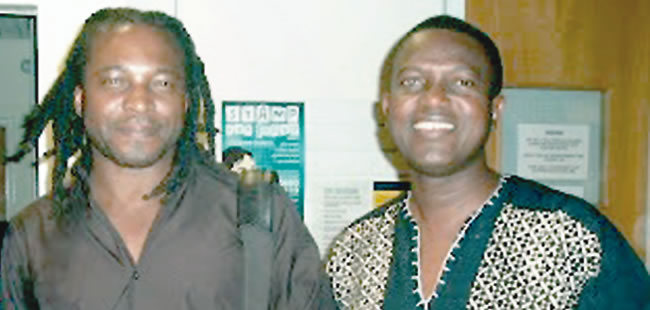The tragic passing of the writer, poet and filmmaker leaves the creative sector devastated and poorer.
ON Saturday, July 30, the Secretary General of the Pan African Writers Association (PAWA), Dr Wale Okediran, sent a post entitled ‘Flashback’ to his WhatsApp contacts. It was a photo of himself and the writer/director, Biyi Bandele, accompanied by a caption which read: “Dr Wale Okediran, the then President, Association of Nigerian Authors (ANA) with Biyi Bandele (left in the above picture) at the launch of Biyi’s new book ‘Burma Boy’ at Lewisham Library, London, the UK on June 21 2007. The author later read from the book about the involvement of West African soldiers in World War 11. According to Biyi Bandele, the book was inspired by his father’s experience in Burma.” In a follow-up post, he added that the writer, editor and critic, Molara Wood, took the photograph.
Almost a week later, the news of Bandele’s passing broke. It was a short statement released by his daughter, Temi, that sent people in the creative sector into a tailspin. Many wept (some others are still weeping) over his untimely passing.
Despite Temi’s post, some found the news incredible. They queried its veracity late into Monday, wondering how it could be when he wasn’t poorly previously. Tributes have since been pouring in, with friends and associates lamenting the monumental loss.
Molara Wood said, “Biyi Bandele’s passing is a profound tragedy, and we already feel his absence so keenly. He was unique in the place he occupied in Nigerian writing, and we grieve because he was still in the afternoon of his days, he still had so much to give, many glories still lay ahead for him. We also grieve for ourselves because we will now have to do without this generational talent, and we are all the poorer for it. I would like to remind everyone that he was primarily a writer, and primarily a writer he remained. Brilliant and prolific, he left us outstanding novels and plays. It’s astonishing what he was able to achieve in a relatively short time. We must honour and uphold his legacy by reading his works.”
Okediran, who posted on July 30, explained his action: “I was browsing the internet researching an essay I was working on when I stumbled on a reference to Biyi Bandele. As I continued reading, a photograph I had taken with him during the launch of his book, ‘Burma Boy’, in London, UK, on June 21 2007, popped out. Fascinated by the discovery, I sent the picture to Biyi Bandele’s Facebook and Molara Wood, who had invited me to the event. A few days later, Biyi replied: ‘Wale Okediran, I remember that reading at Lewisham Library. In the days of my youth! You were there with a friend, I remember.’
“Apart from being devastated by the terrible news, I was puzzled on how I could have chatted with someone I last met 15 years ago, just eight days to his death. Was it a premonition or just a farewell message from one writer to another? He may have died young, but he lived a fulfilled life. May the good Lord rest him.”
Dr Sola Adeyemi of the University of East Anglia, Norwich, UK, in a tribute entitled ‘For Biyi Bandele who snapped and snapped out’, also affirmed Bandele’s qualities. He highlighted the writer’s love of his Yoruba roots which made him insist on making ‘Elesin Oba’, the film adaptation of Professor Wole Soyinka’s ‘Death and the King’s Horseman’ partly in Yoruba.
Bandele told the scholar: “Netflix has been a gift. I had to fight to allow them to make Elesin a Yoruba film (well, not quite totally Yoruba; all the English characters still speak English), and to their credit, they said go-ahead. The BBC would have sacked me and got someone who would shoot it in English. And no American studio would have gone anywhere near the project. Though, nationalism wasn’t even a factor when I decided to make it in Yoruba. I did so because I believed it would make it infinitely more accessible. I think it is.”
Aside from his impressive stride in literature and filmmaking, the writer, born in Kafanchan, Kaduna State, on October 13, 1967, was an inspiration to many, including one. Circa 1996, we would converge on Educare Trust, Coca-Cola, Ibadan to browse and borrow available creative works stocked at the youth centre established by Dr Tony Marinho. Some older colleagues, including Folorunsho Moshood, the late Wole Adejayan and the poet Kunle Okesipe, author of the newly released poetry collection, ‘Sometimes I Too Am a River’ would regale us with stories of Bandele’s achievements.
They told us how he left the University of Ife (now Obafemi Awolowo University) to study in London after winning a play competition and remained there. We wanted to be like that too. Go to the UK and churn out creative works that would make us household names among young Nigerians. Curiously, in almost two decades of arts and culture journalism, one never interacted with him one-on-one but followed his progress. One was excited to watch movies he directed, including ‘Half of a Yellow Sun’ and ‘Fifty’ and eagerly awaited ‘Elesin Oba’, set to premiere at next month’s Toronto International Film Festival.
Sadly, the beat will now go on behind his back. Mo Abudu, the producer, continued with the publicity mere days after Bandele’s passing. She posted on Instagram during the week: “Always dream big because a piece of big is still better than a piece of small.” Quoting Les Brown in a somewhat insensitive graveyard analogy considering what had happened, she added: “The graveyard is the richest place on earth because it is here that you will find all the hopes and dreams that were never fulfilled, the books that were never written, the songs that were never sung, the inventions that were never shared, the cures that were never discovered, all because someone was too afraid to take that first step.”
But then, as the Yoruba say, “bi onirese ko ti o fin igba mo, eyi to ti fin sile koni parun lailai”, meaning if the master carver decides to stop producing exquisite calabashes, the ones he previously made will not perish. The author of plays, including ‘Marching for Fausa’, ‘Resurrections in the Season of the Longest Drought’, ‘Two Horsemen’, ‘Death Catches the Hunter’, ‘Me and the Boys’, ‘Way Past Cool’, ‘Things Fall Apart (adapted from Chinua Achebe’s self-same title), ‘Rasselas’, ‘Oroonoko’, ‘Brixton Stories/Happy Birthday’ and ‘Mister Deka’ lives on.
We will continue to honour and uphold his legacy by reading his novels ‘The Man Who Came in from the Back of Beyond’, ‘The Sympathetic Undertaker and Other Dreams’, ‘The Street’ and ‘Burna Boy’. Though his passing is profoundly tragic, we will continue to revel in his works. They will never die.
ALSO READ FROM NIGERIAN TRIBUNE
WATCH TOP VIDEOS FROM NIGERIAN TRIBUNE TV
- Let’s Talk About SELF-AWARENESS
- Is Your Confidence Mistaken for Pride? Let’s talk about it
- Is Etiquette About Perfection…Or Just Not Being Rude?
- Top Psychologist Reveal 3 Signs You’re Struggling With Imposter Syndrome
- Do You Pick Up Work-Related Calls at Midnight or Never? Let’s Talk About Boundaries






